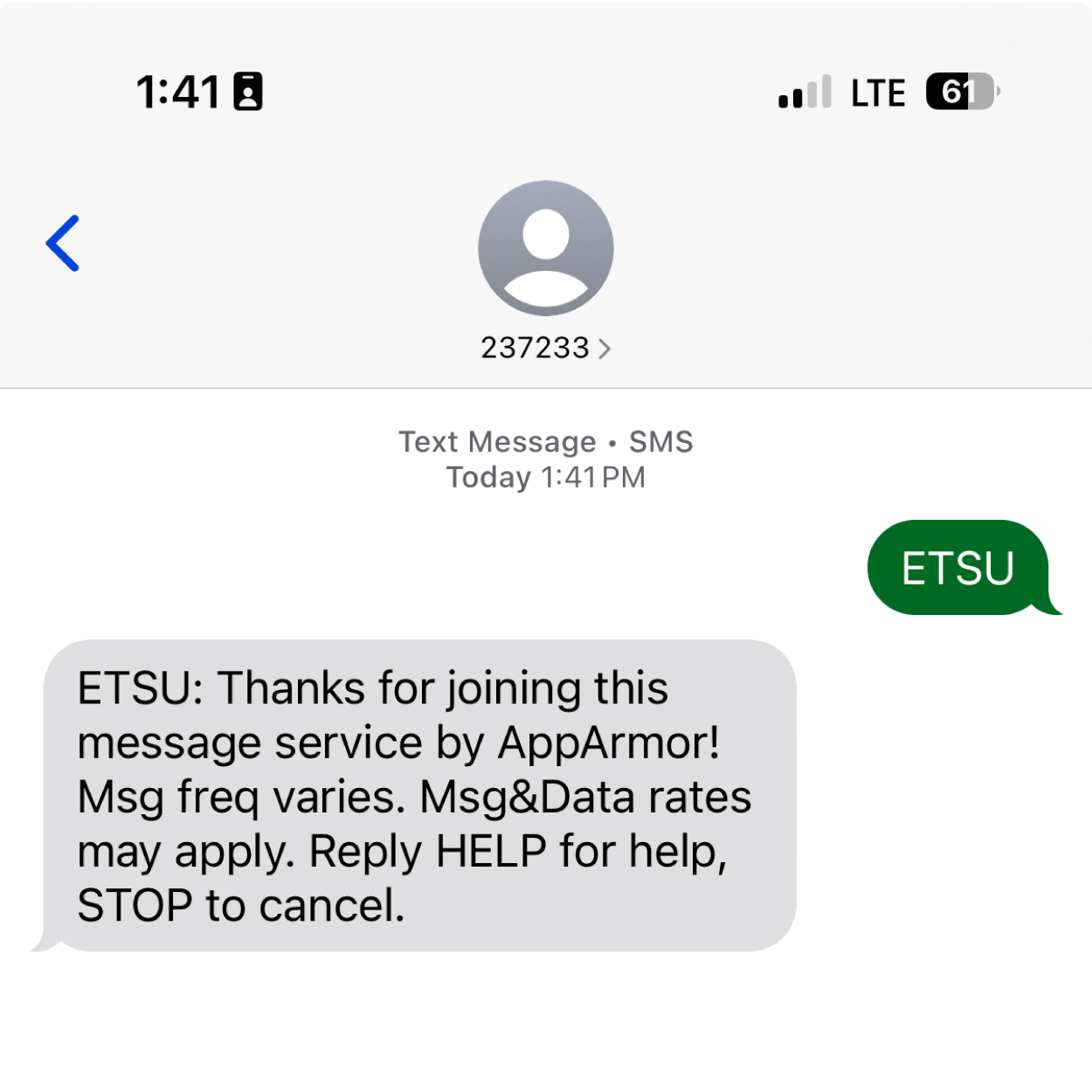Our goal is to communicate safety information and emergency alerts to our campus community.
Sign up for automated safety alerts and learn about the various ways in which ETSU communicates with the campus community during an emergency.
Subscribe to Emergency Alerts
Mobile App
The ETSU Safe Mobile App is the university's primary notification platform. Download the app to receive timely safety alerts.
The app also features the ability to report tips, request a friend walk, and emergency plans for incidents such as a tornado, natural disasters, active shooters, and other situations.
Be sure to update your push notification settings to receive any emergency alerts.


Text Messages
To receive emergency alerts via text messages:
Text ETSU to 237233
Standard message and data rates may apply. You may text the word STOP to cancel at any time.
Other Types of Emergency Communication
-
Sirens and Voice Messages
Outdoor speakers are equipped with both siren/tone and voice command capabilities. When the warning system is activated, a brief siren/tone will be transmitted, followed by voice instructions, and then a longer siren/tone.
Whenever an emergency poses a direct threat to the university community, the system will warn the campus with siren sounds followed by an instructional message.
For example, during an inclement weather event (such as a tornado) the siren will sound followed by the following message:
"Attention! Life-threatening situation. A tornado has been sighted in the area. Seek shelter inside or take cover immediately. Stay away from windows and doors."These warnings will continue sounding until the coast is clear. At that point the following "all clear" message will sound:
"Attention! All clear. All clear. ETSU Public Safety has issued an all clear. Resume regular activities."
The siren system uses pre-recorded messages, but also may be used to directly communicate, similar to a PA type system, in order to communicate a threat not identified by the prerecorded messages.
It is important to remember that the sirens will only sound when the campus is at immediate risk. For example, the sirens will not sound every time there is a tornado warning in Washington County, but they will sound when there is a tornado warning that directly impacts ETSU. The system will not be used for anything other than immediate threats to the health and safety of the campus community.
-
Alert Webpage
Alert messages will be posted on ETSU's Alert Page. This site is used for emergency messages as well as general informational messages (i.e. scheduled power outages, roadwork, fire alarm testing, etc.).
-
Email Alerts
Automatic email alerts are sent to all student, faculty, and staff email accounts.
-
Campus Screens
Campus screens, including computers, will display the emergency alert in red.
-
Campus Cable TV
Alert messages will be displayed on the campus cable TV Channel. This channel is only available to on-campus locations.
-
Radio Broadcast
ETSU's Public Broadcast Station, WETS 89.5 FM, will be utilized to broadcast emergency messages.
Local media sources (i.e. TV and Radio Stations) are used, as appropriate, to broadcast emergency information about ETSU.
Types of Emergency Alerts
You will either receive an “emergency notification” or a “timely warning.”
Emergency Notifications
Emergency notifications will be sent when there is an event that is currently occurring or imminently threatening campus. These apply solely to situations occurring on campus. All systems may be utilized to communicate the notification.
There are three types of emergency notifications:
- Secure-in-place by placing a locked door or other barricade between you and the associated violence or danger.
- Shelter-in-place events are usually weather-related emergencies. When it is necessary to shelter-in-place,
you will be safest by moving inside to a building space that protects you from the
danger. Do not lock doors behind you as others may also need to shelter-in-place.
- Evacuate events may be natural disasters or manmade events (i.e. fires, floods, or chemical releases).
Timely Warnings
Timely warnings alert you to potentially dangerous situations and remind you to be diligent and aware. If you receive a timely warning notice, you can continue with your everyday life but be extra alert. In other words, they are intended to provide notifications, not instructions.
Remember, always use good judgment. There are exceptions to all guidance and prescribed directions.
 Upcoming Phone Firmware Updat...
Upcoming Phone Firmware Updat...  Annual Steam Shutdown--2025
Annual Steam Shutdown--2025